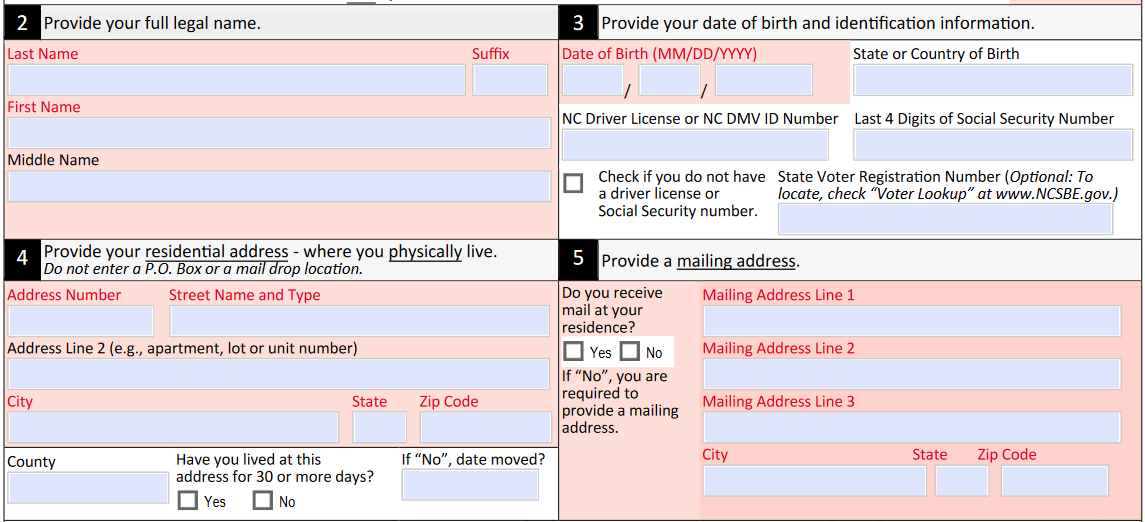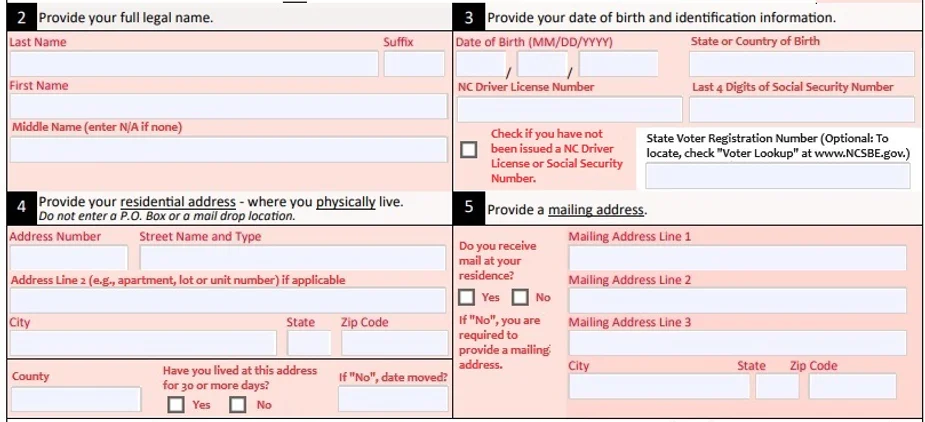Election officials have been deviating from state and federal voter registration laws for two decades. A citizen complaint forced the North Carolina State Board of Elections (SBE) to start complying, but more action is needed to fix the damage caused by that deviation.
Federal and State Law Requires ID Numbers for Voter Registration
The Help Americans Vote Act of 2002 (HAVA) requires election officials to get identifying information of everyone who registers to vote (page 45). It also details which information those officials should gather and in what requisite order:

The vast majority of North Carolinians have one or both of those IDs. For the tiny portion of eligible voters who have neither, the law requires states to issue them “unique identifying numbers.” Those numbers are not interchangeable: the law requires seeking the ID numbers first.
The law also states, “an application for voter registration for an election for Federal office may not be accepted or processed by a State unless the application includes” one of those numbers.
North Carolina law (GS 163-82.4) also requires voter registration application forms to request the registrants’ “[d]rivers license number or, if the applicant does not have a drivers license number, the last four digits of the applicant’s social security number.” Again, the law includes a provision for election officials to provide a unique identifier for any voters who do not have either of those ID numbers.
Those numbers are not included in the list of optional information in the law:
The county board shall make a diligent effort to complete for the registration records any information requested on the form that the applicant does not complete, but no application shall be denied because an applicant does not state race, ethnicity, gender, or telephone number.
Having that information can make North Carolina’s voter rolls more secure by allowing election officials to better crosscheck rolls against other data sources, verifying that they are who they say they are and confirming that they remain eligible to vote where they are registered. While only the SBE uses the identifying numbers it gives to voter registrations, driver’s license numbers and the last four digits of social security numbers are also on other government databases such as death records.
State Elections Board Made Required ID Numbers Optional
However, according to a HAVA complaint Carol Snow filed with the North Carolina State Board of Elections (SBE) on October 6, up to 217,977 voter registrations filed after HAVA went into effect lack either of the required ID numbers (the number includes registrations for which the registration date is unknown). It is doubtful that there are that many registered voters in North Carolina who lack both of those ID numbers.
One likely culprit for the improbably high number of registrations without the required identifying ID numbers is the design of the state’s voter registration form. As seen in the screenshot below, the form design makes it appear that providing that information is optional. Required fields are in red, and the field requesting that information is not so colored.

Instructions on the back of the form request that information, but many people registering will likely not notice that, especially since it conflicts with the visual information on the front.
Joanne Empie, Legislative Advocacy Team Co-Chair of the NC Election Integrity Team (NCEIT), who brought the effort to fix the problem with the voter registration form to my attention, also sent a link to a suggested remedy:

An SBE instructional video compounds the problem. It lists the information required on the form as “eligibility requirements, your name, date of birth, residential address, mailing address, and your signature.”
The high number of registrations without the required identifying information is also a sign that election officials did not “make a diligent effort to complete for the registration records any information requested on the form that the applicant does not complete” as required by state law.
Public Pressure Makes Election Board Take a Step Towards Reform
The State Board of Elections addressed the HAVA complaint at their November 28 meeting (the portion of the meeting dealing with the complaint starts near the 1:08:55 mark).
The complaint requested five corrective measures from the board:
-
- Please revise all versions of the NC Voter Registration Application to use red colored text and red tinted background for all required personal identifying information, including the Driver License number if issued, or if no Driver License, the last 4 digits of their Social Security Number if issued.
- Please revise the “Register to Vote in North Carolina” video posted on YouTube on 8/17/2021 by the North Carolina State Board of ElecƟons to be consistent with the above changes. https://www.youtube.com/watch?v=ZvYUqlFgpw0
- Please revise all versions of the NC Voter Registration Application to make it a requirement to “Check if you do not have driver license or Social Security number” when both numbers are not
provided. - Old versions of the NC Voter Registration Application form will not be accepted.
- Please make North Carolina compliant with Sec 303(a)(5)(A) of the Help America Vote Act of 2002, by obtaining this required identifying information, if possessed, from the 217,977 Registered voters who registered on or after 1/1/2004, or their registration date is unknown, but are missing this personal identifying information.
During the meeting, SBE General Counsel Paul Cox revealed that “some spot checking” of registration records revealed some of the missing ID numbers were due to county elections officials not “populated into the statewide computerized database.” That explanation of how some numbers are not in the system does not correct the problem.
Under Cox’s advice, the board agreed to the first recommendation, which also implies acceptance of the second and third. Also under Cox’s advice, they refused to ask election officials to make any effort to complete the missing identifying ID information for the 200,000+ registrations that lack it. There was no mention of the fourth request, but the most likely outcome is that the old forms will continue to be accepted as they are phased out.
What is Next?
SBE Executive Director Karen Bell said that they are already in the process of updating the voter registration forms.
Again, state law requires a “diligent effort to complete for the registration records any information requested on the form that the applicant does not complete.” If election officials can access the affected registrants’ identifying ID numbers, they must put them into the system. If they do not, federal law requires them to make a “diligent effort” to get them.
The board’s failure to instruct election officials to make even a minimal effort to correct problems with the state’s registration records means that election reform advocates will continue to work to get the board to do what the law requires. What is unknown now is if that work will take the form of further lobbying of the SBE, convincing members of the General Assembly to take up the issue, or filing a lawsuit.
